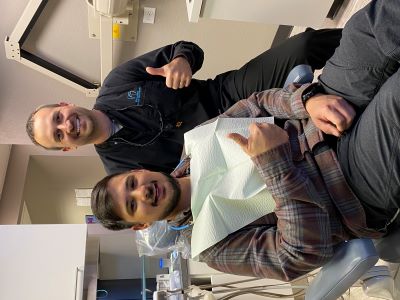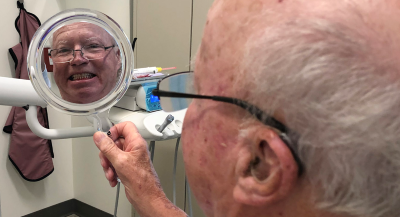Enter your email to receive the CareQuest newsletter:
November 4, 2024
They’ve served our country, putting their lives on the line, yet many can’t even access basic, necessary oral health care services.
“One veteran was preparing to have to make a choice to either pay for the dental procedure he needed or buy Christmas presents for his grandchildren,” says Rob Tempel, DDS, retired US Army Major General and now associate dean for extramural clinical practices at East Carolina University (ECU) School of Dental Medicine in North Carolina. “Another veteran pulled his own tooth out, seeing no other option.”
And, unfortunately, veterans in North Carolina aren’t the only ones who have to make those drastic decisions. Many veterans across the country have oral health problems.
“A US Army veteran who came to Everyone for Veterans (E4V) was dealing with shame and embarrassment from a missing tooth that had been pulled two years ago,” says Jessica Elwell, the executive director of E4V, a national organization that provides veterans with resources, support, and comprehensive dental care. “That veteran wrote a letter to E4V saying, ‘I would find myself feeling embarrassed every time that I was in public or when my grandchildren asked me why I had a missing tooth.’”

To help find solutions for the thousands of stories like these in communities across the country, in August CareQuest Institute funded 10 projects that aim to improve access to oral health care for veterans. Each project selected received $125,000 each, for a total investment of $1.25 million. The Institute will also share best practices with those selected organizations, connect them with resources, and create a community dedicated to improving the oral health of veterans.
The Battle to Advance Veterans’ Oral Health Care
There are multiple reasons — from financial to educational barriers — why many veterans can’t get access to oral health care. Many of those reasons are systemic, meaning they aren’t quick fixes that can happen overnight.
“Many veterans do not qualify for consistent dental care through the Veterans Affairs (VA) hospital or VA Community Care Network partners, unless they are 100% service-connected disabled,” says Frank Lombard, the UP veterans program manager at Upper Peninsula Commission for Area Progress (UPCAP), an organization that provides services and support to Upper Peninsula residents in Michigan. “Veterans have reported not visiting a dentist in many years, and some only do once they have a crisis requiring major dental care or complete removal of all their natural teeth.”

Additionally, Medicare only pays for certain dental services patients receive in the hospital, and Medicaid provides limited or no adult dental benefits in several states.
The organizations selected for CareQuest Institute’s grants — including ECU Dental School of Medicine, E4V, and UPCAP — will use their funding to remove barriers and make care more convenient for veterans.
“When people are informed about ways they can get involved, it creates opportunities for meaningful change,” Elwell says. “With this grant, we hope to inspire more participation in providing care and support to our nation's veterans, ensuring they receive the services and support they deserve.”
Here's how all 10 organizations plan to use CareQuest Institute’s funding to drive change to improve veterans’ oral health.
- Dentistry 4 Vets (D4V) in California will address system-level barriers to oral health and increase veteran utilization of dental care by modeling their unique methods of establishing authentic relationships with veteran patients, including personalized care plans, regular follow-ups, and tailored communication.
- East Carolina University (ECU) School of Dental Medicine in North Carolina will make policy change efforts by demonstrating the need for models of care that make use of multidisciplinary teams that facilitate whole-person care for veterans with chronic illnesses and disabilities that include diabetes, hypertension, and cardiovascular disease. The goal is to demonstrate reduced net costs and improved quality of life through care integration focused on prevention and early intervention for optimizing oral health among veterans.
- Everyone for Veterans (E4V), a national organization, will offer training for dental schools and students on veteran-specific oral health care, with a trauma-informed approach to address PTSD and anxiety. They’ll also engage the dental community through speaking engagements that focus on the voices of veterans to show the difference between civilians’ and veterans’ dental needs, and advocate for veterans’ oral health and awareness among government leaders and change-makers.
- Family Medicine Education Consortium, a national organization, will work to make changes in how primary care providers approach the oral health care of patients, with a focus on access to appropriate and comprehensive care for veterans.
- Marshall University (MU) Research Corporation in West Virginia will improve access to care for veterans by developing a comprehensive report focused on veteran oral health in the state. MU Research Corporation will collect quantitative and qualitative data from a variety of stakeholders, including dental and medical health care providers, veterans, nonprofit organizations, and government agencies. The final report will include a summary of the oral health and overall health of West Virginia veterans, access to oral health services, and existing barriers to care.
- Mercy Foundation (MF) in Oregon will address the oral health needs of local veterans admitted to Mercy Medical Center. MF will use an expanded practice dental hygienist and dental assistant to provide patients with preventive care, including assessment, fluoride varnish, silver diamine fluoride, sealants, and education. When they leave the medical center, MF will provide patients with a care plan and connection to a dental home for additional treatment and ongoing preventive care.
- Missouri Coalition for Oral Health (MCOH) will gather and apply data-driven and lived experience insights to better understand and address the unmet dental needs of Missouri veterans while elevating the importance of veteran oral health among MCOH members, partners, and stakeholders. The desired outcomes of the project include identifying specific gaps in dental care services for veterans in the state, raising awareness of these challenges, and collaborating with veterans and partners to identify strategies for policy change to improve access to quality dental care.
- Missouri Office of Dental Health (ODH) will evaluate the Missouri ODH’s current work with AT Still University’s dental clinic where their dentists and dental students provide dental care to veterans through the Smiles for Vets program. The goal of the evaluation is to learn why veterans seek dental treatment, how dentists can improve care they provide, why dental students want to provide care in clinic to veterans, and what would make them continue that care to veterans upon graduation.
- University of Texas Health Science Center at Houston will conduct a pilot study that will investigate the impact of dental care in behavioral health treatment among veterans and the use of digital dentistry in expanding access to dental care among veterans.
- Upper Peninsula Commission for Area Progress (UPCAP) in Michigan will conduct community forums in multiple locations to engage veterans, service members, families and caregivers, dental providers, insurers and health plan providers, and federal and state policymakers regarding the state of veteran oral health care and barriers to access. They will create and distribute communications to media outlets about veterans’ oral health and present a public report on the findings to inform programming and policy suggestions.
For more information on CareQuest Institute’s grants, go to carequest.org/philanthropy.